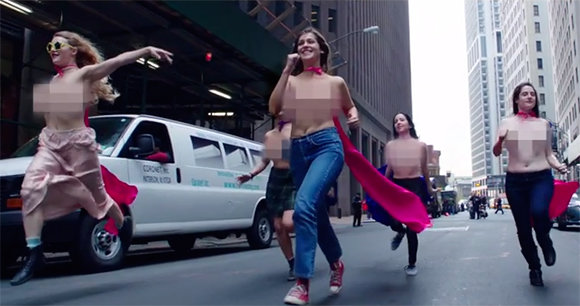Our emancipation as women is directly connected to our status as equal human beings—not objects.
I’ll never forget the first time I saw Jessica Rabbit—no, I’ll never forget the first time I saw her breasts. Voluptuous and bursting out of her sparkling red dress; they were mesmerizing. I knew I had to have a pair.
Growing up my breast fetish didn’t fade but only grew stronger. While my brothers and dad looked at car magazines in the grocery store I’d swipe a Sports Illustrated to look at the “sports.” I waited and waited for what seemed like forever (I was 15) but my Jessica Rabbit boobs turned out to be a no-show. So I took matters into my own hands. Armed with a checking account number and magazine ads for breast-enlargement pills, I purchased and consumed copious amounts of what probably was oregano.
Turns out, I’m not unique in my breast fetish.
With the recent rise in popularity for the #Freethenipple movement, boobs seem to be on our culture’s collective brain. Miley Cyrus bared her breasts on Twitter as a shout out to equality as did Scout Willis when she walked around NYC topless. But is #Freethenipple just an attention-grabbing fad or a legit protest and step toward gender equality?
Our culture is boob obsessed, that’s for sure. Everywhere you look, breasts are being used to sell everything from cars to Carl’s Jr. But are we biologically boob-brained?
The facts is, breast are not inherently sexual (unless you consider breast feeding a sex act). Society sexualized them. Human beings, like all mammals, bare them as a source of nourishment. Though it is a basic biological function between a mother and her child, breastfeeding is often met with discomfort and disgust. On the flipside, the only places one can see naked breasts in their entirety are strip clubs and porn (well OK, and HBO).
It’s commonly assumed that breasts have always been seen as sexual by the human animal. This is simply not historically accurate. For much of human history, female and male breasts were treated the same. Until recently in large parts of Africa, Asia, and the Americas women went topless. It was the spread of Christianity and Islam as well as missionaries that altered local culture’s aesthetics. Even in Europe leading up to the 15th century, going topless wasn’t seen as inappropriate as breasts were associated with children and motherhood—not sex. In the United States, men’s breasts were sexualized along with women’s for fear of “impressionable women” and children. It wasn’t until men started protesting and going topless that the culture changed.
So what if the sexualization of breasts isn’t “natural”? Isn’t fetishization just one more way for us to get our kicks?
The problem with sexualizing female breasts is that it furthers our status as sex objects existing for male pleasure. It furthers our “otherness.” We do not sexualize men the way that we sexualize women and it hurts us. It dehumanizes us, it devalues us, and is often used as a tool for our degradation. Whether it be the remnants of puritanism or patriarchal interpretations of religion; assigning value, honor, and worth to the female form and what a woman does with her body has unhealthy, often deadly, ramifications. We simultaneously worship and shame the female figure. Degrading porn? Awesome. Breastfeeding? So not OK.
Studies have shown that both heterosexual men and women in the United States are more turned on by looking at pictures of naked female breasts than naked men. This isn’t biological, it’s learned. And just as I learned as a young child drooling over a hyper-sexed cartoon to see myself as a pair of tits, women and girls learn to see themselves through that same lens. What we don’t see are breasts normalized. We don’t see the variety and beauty that are women’s breasts but instead are presented with caricatures, cartoons really, of women’s bodies.
If a fetish feels real enough people believe it to be biological. Beliefs about biological differences and superiority/inferiority have been at the root of many of the recent centuries’ enslavement and genocide. Our emancipation as women is directly connected to our status as equal human beings—not objects. Our emancipation is directly connected to our bare, unsexualized breasts. So #Freethenipple and #Freewomen.
Jessica Schreindl is a freelance writer and TV producer in Seattle, Washington. She is a contributing writer for Mic.com and has been published on Feministing.com. She graduated with her M.A. from Syracuse University where she studied film history and documentary filmmaking.
Related Links:

